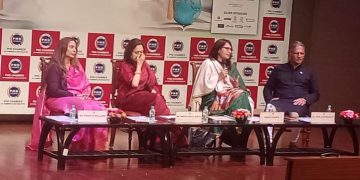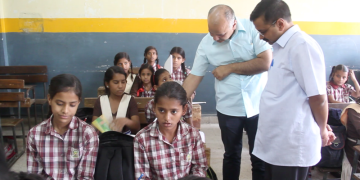For school education in particular, the fallout of covid-19 pandemic is not just learning crisis but much like being in tatters from devastation that a cyclone usually brings about of the landscape in its way. This December, school closures in India entered into its 10th month and effectively meaning the academic year is heading towards a ‘zero academic year’ unless schools reopen in January and a likely scenario in which annual exams are postponed by a few months.
Despite the best intentions and efforts of education departments of states and union education ministry, online education has been a mirage for an overwhelming majority of children. Several surveys conducted in the lockdown period by likes of ASER Centre, Oxfam, Centre for Budget and Policy Studies and others have confirmed that vulnerable and backward regions of the country are severely hit by no learning in the period. Even a vast majority of middleclass students in average families haven’t been able to access to devices freely as in most cases the same device is being shared for work for home by parents or other siblings for studies. And learning by online is overrepresented. One-third of students in a NCERT survey in August 2020 had found online burdensome and difficult. In this scenario, even the best online methods can’t claim of achieving learning of the same level as in-school/classrooms. The big picture therefore is shift to online learning, which was an emergency measure, has at best engaged students but not achieved learning outcomes of the desired levels. On ground conversations also confirm this. “I take tuitions in addition to online classes to study but it isn’t the usual way. I am not able to grasp fully, at times the internet connectivity snaps. If I were to compare this with our regular classes in school, this is least interesting or absorbing. I have almost given up on online classes because of boredom,” says Rohit Kumar, a class XII student of a prominent school in Delhi.
In this backdrop, assessments or exams, a critical component of learning evaluation and in several ways central to progression of students and their upward mobility, is now emerging as challenging as the shift to online academic activities. School boards have completed registration process for their examinations, now all eyes on the schedule. Though a final decision on dates is yet to be announced, most students are gripped by examination stress as they haven’t attended a single class physically in their schools and practicals, an integral part of teaching/learning has been a fatality and will carry an impact on the learning competences. They along with other shareholders want the uncertainty on exams to end.
Gerry Arathoon, Chief Executive and Secretary, Council for the Indian Certificate Examinations (CISCE), one of the major national boards in the country, has in fact requested the chief ministers of all states/UTs to allow schools to allow partially, specifically for the students of class X and XII from January 4, 2021. “With the students physically attending schools, this time will be utilized for practical work, project work, SUPW work and for doubts clearing lessons. This will be extremely beneficial for the students who will get the time to directly interact with their teachers,” he said in a statement on Dec 3.
With election schedule coming for five states of Tamil Nadu, West Bengal, Assam, Puducherry and Kerala in May-June 2021, he also requested chief election commissioner to share schedule so that board exams can be scheduled accordingly.
Along with board examinations, which are likely to be deferred by a couple of months, competitive exams like JEE, NEET etc conducted by National Testing Agency (NTA) have also gone out of sync and January-February schedule is already suspended. The Government has asked NTA to take reduction in syllabus into account while preparing tests. In all likelihood, January schedule of the NTA for JEE/NEET will be postponed by a month and if things work well, the rest of the cycles will not be affected. “The effect of this year is likely to be reflected across the board and there should be an effort to take a sympathetic view of average student of this country. Students need not to panic but stay positive and concentrate on what they have already read. Once reduction decision is also corroborated by NTA, they can skip those topics in revision,” advises Saurabh Kumar, director academic, Vidyamandir Classes, a prominent coaching institute in north India.
With the recent news on vaccines giving way to optimism and hope of better days ahead, the disruption in education may gradually fade away. But the important lessons and challenges need more attention at all levels.










